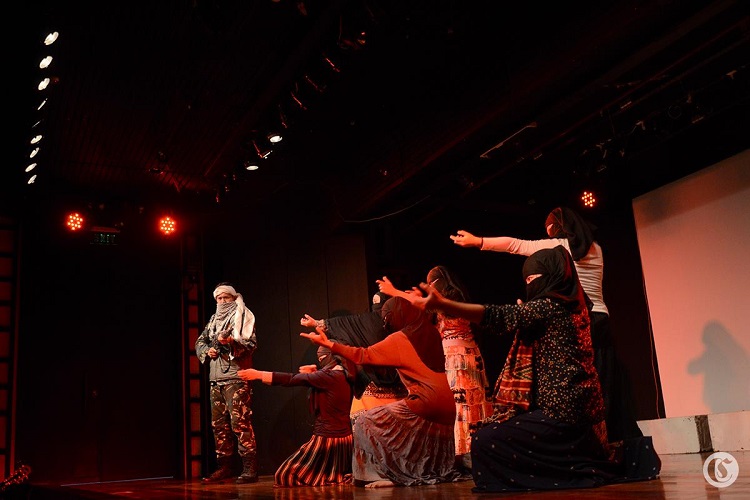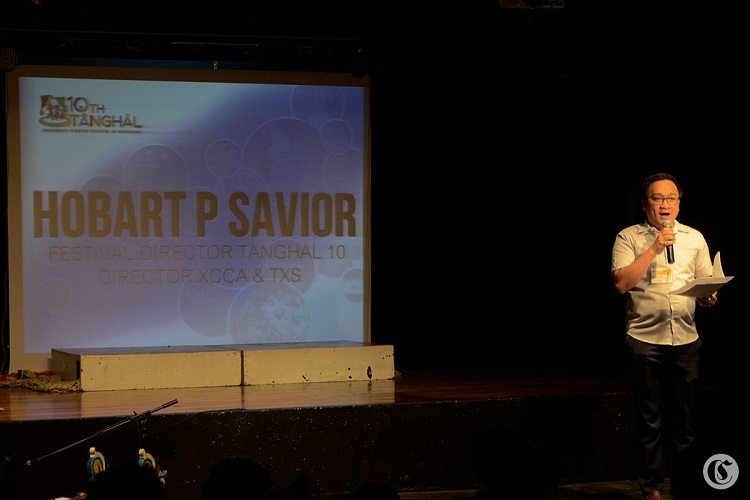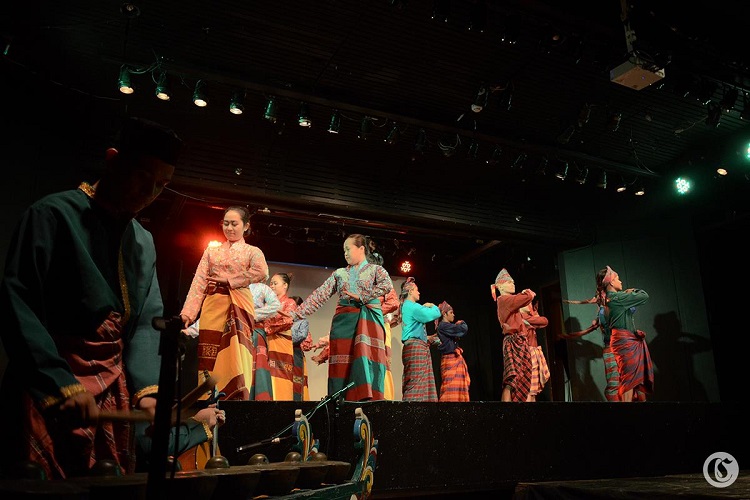
UNDER THE RAIN OF BULLETS. Mindanao State University Marawi's Sining Kambayoka Ensemble performs "Sa Ilalum Sa Mga Nag Ulang Tingga," directed by Pepito Sumayan of and written by Marili Fernandez-Ilagan and Sunnie Noel, at the XU Little Theater as part of the major offerings of the 10th Tanghal Univeristy Theater Festival.
Words by Stephen Pedroza
Photos by Coleen Vitor/The Crusader Publication
CAGAYAN DE ORO CITY, Philippines — From broken dreams to vivid aspirations, different plays on Mindanao’s diverse narratives took center stage at the 10th Tanghal University Theater Festival held on November 25 and 26 at Xavier University - Ateneo de Cagayan.
The festival was composed of three main performances from XU’s The Xavier Stage, Mindanao State University Marawi’s Sining Kambayoka Ensemble, and La Salle University Ozamis’s Teatro Guindegan, and two fringe presentations from Xavier’s Dulaang Atenista and Pasundayag Community Arts of Cagayan de Oro City.
Through the support of the National Commission for Culture and the Arts’ National Committee on Dramatic Arts, the tenth installment of Tanghal formed part of the celebration of the Mindanao Week of Peace 2016.
In this year’s Tanghal, Mindanao was given Earth (Yuta) as its theme, to which the host institution Xavier Center for Culture and the Arts (XCCA) appropriated Yuta to signify Mindanao as the “Land of Promise and Peace” and curated plays about our ethnicity, hopes, and origins.
All shows of the 10th Tanghal University Theater Festival were open to the public for free and were held at the XU Little Theater.
The Moro question
The Xavier Stage (TXS), a resident repertory theater company of Xavier University, presented a twin-bill of Dr Art Casanova’s “Nang Lumuha ang mga Tala sa Gitna ng Lawa” and Romeo Narvaez’s “Dula Ta.” This amalgamated production was aptly titled “Singanin,” a Meranao term for “aspiration.”
Singanin depicted the struggles of the Moro people who were victims of the Mindanao conflicts in the areas of North Cotabato, Lanao del Norte, Lanao del Sur, and the Zamboanga Peninsula.
Casanova’s part presented cunningly the intertwines of land grabbing, hunger and poverty, and the infamous clashes between the Ilaga and the Barracudas — who were para-militaries created by scheming politicians a year before the declaration of Martial Law in 1971. Meanwhile, Narvaez poignantly reflected the contemporary Mindanao conflict through the eyes of two children who witnessed the ravages of war at a young age.
Singanin was staged under the artistic direction of Hobart Savior, who is also the director of XCCA.
“Mindanao theater is alive!” Savior exclaimed. “Through this theater festival, we hope to highlight the issues at the peripheries and the historical injustices in Mindanao. It has been one of the missions of The Xavier Stage to showcase plays with social relevance and with peace as an aspiration.”

FESTIVAL DIRECTOR. Xavier Center for Culture and the Arts director Hobart Savior delivers his message to the audience of the 10th Tanghal Univeristy Theater Festival at the XU Little Theater.
Under the rain of bullets
Mindanao State University Marawi's Sining Kambayoka Ensemble staged their critically-acclaimed “Sa Ilalum sa mga Nag-ulang Tingga” (Under the Rain of Bullets), directed by Pepito Sumayan.
Sumayan, a Meranaw native, is an actor, writer and cultural worker based in Lanao del Sur. He is a homegrown talent of Sining Kambayoka and he first appeared in “Mga Kuwentong Maranaw” in 1993.
“Under the Rain of Bullets” was written by seasoned playwrights Marili Fernandez-Ilagan and Sunnie Noel.
Heaven or hell
Completing the three major offerings of the 10th Tanghal festival was La Salle Ozamis's Teatro Guindegan's “Ang Tawo.” Directed by Felimon Blanco, the play followed the death of “Tawo,” an allegorical figure of humanity. When Tawo was called upon by Kamatayon (Death) to face his end, he approached his friends and family, but no one wanted to accompany him to the “Other Side.”
With allusions of man’s seven deadly sins, Tawo considered bringing his wealth in the afterlife, but it wouldn’t save him either. His last resort was to approach Paghigugma (Love) whom he has forgotten for a long time. Paghigugma also invited Matandang Propesor and Batang Propesor, metaphorical figures of the Church, to join them in the journey.
Tawo had to cleanse himself from his sins so he could enter the Paradise.
‘No Prob, It’s Improv’
Tanghal theater festival also offered fringe performances.
The 28-year-old Dulaang Atenista, the resident theater company of Ateneo de Cagayan, also performed the crowd-favorite “No Prob, It’s Improv,” a live improvisational performance wherein actors created plot, characters, dialogues, and scenes on the spot. Their show was under the artistic direction of Ray Anthony Lao.
“No Prob, It’s Improv,” was formed after a few DA members were exposed to “Whose Line is it Anyway?” re-runs and shows of the Bacolod Improv Group back in 2010. Later on, they were able to use Peque Gallaga’s modified Viola Spolin workshops which were beneficial to the group and to their live skits.
Dulaang Atenista has cemented itself as a major force in Cagayan de Oro City’s improvisational theater scene.

A SCENE FROM SA ILALUM SA MGA NAG-ULANG TINGGA. “Sa Ilalum sa mga Nag-ulang Tingga” (Under the Rain of Bullets) was written by seasoned playwrights Marili Fernandez-Ilagan and Sunnie Noel from Mindanao State University Marawi.
Documentary-demonstration on Alibata
The Pasundayag Community Arts and Production (formerly known as Pasundayag Theater and Arts Collective) presented a documentary-demonstration performance.
Pasundayag project director Denise Mordeno Aguilar shared her experiences as a scholar of the program, Professional Diploma in Intercultural Theater (Major in Acting), at the Intercultural Theatre Institute in Singapore. Her scholarship was made possible by the generosity of the NCCA and the Kuo Pao Kun Foundation.
Part of Mordeno’s discussion was a documentary film on our Sinaunang Baybayin, the outcome of a series of activities from a workshop facilitated by Emil Yap, an expert on the ancient Filipino writing system, famously coined as “Alibata.”
“Baibayin” or “baybayin” is a system of writing of our Filipino ancestors, which started from the root word “baybay” or “baibai,” meaning “spelling or tracing.” The Sinaunang Baybayin is not based on the Doctrina Christiana developed and widely disseminated by the colonizers; in fact, this is the “Alpabeto ni Bonifacio,” which the Katipuneros used in their secret covenant.
Pasundayag is a community arts group in Mindanao whose theater apprentices are now the young blood not only in Mindanao theater, but also in the national stage, such as Mark Bautista and Johnny Macanas. Since its first production in 1998, Pasundayag has become a platform for multidisciplinary initiatives on culture and the arts in the region.
The group also intends to open its own studio based in Cagayan de Oro City to conduct classes for those who are interested to learn about contemporary theater work.
The recently-concluded Tanghal university theater festival was a reflection of Mindanao’s rich narratives, from broken promises to sharp-witted vignettes to bright aspirations for the second largest island of the Philippines. ∎